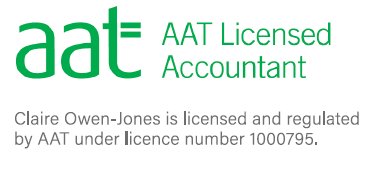Your business has two primary functions. The first is to attract customers and the second is to turn these customers into cash. I know it all sounds very cold; there's no hint here of your passion or your goals but ultimately that is what every business is trying to do.
This means that when you start a business a marketing hat is glued to your head. You can never take it off. Ever. It doesn't matter if you are writing an email or speaking to someone who could know someone else who may at some point in the distance future need your product or service, you are marketing.
Now we also have a finance hat because now we must decide on prices, monitor cash flow, make sure we get paid and so on. But I know from experience that people don't like the finance hat. It scratches, it clashes with your outfit and you don't want to wear it. So, you either try to give it to someone else or you put it away in a wardrobe and only bring it out on special occasions like when you need to apply for a loan or pay some tax.
But really, both hats are the same. I would almost go as far as saying identical. You've just decided that you don't like one of them. It's all in your mind.
So here is how and why you should apply your marketing hat mindset to your possibly unloved finance hat.
Have a central hub
If I was to tell you that your business needed a website, you wouldn't think I was mad or wacky in anyway. It's pretty much accepted that you need an online presence. Not necessarily a £30,000 bells and whistles website, it could be a simple template one that you've built yourself but you need to have one. Hinge marketing undertook some research that showed that 80% of professional service buyers checked out a website before making contact. The percentage will be different for your industry but it's never going to be zero; we all use Google, we all check out websites.
So, your website is the central hub of your marketing. After a networking meeting, people will check out your website. Your direct mail will have a link to your website. Your social media accounts will link to your website. Everything will link to your website.
Do you have a central hub for your finances? After all it is the second in the two primary functions of your business? Without it you are generating lots of customers that could be making you little or no money whatsoever. Like a website, wouldn't it make sense to have one place where all your financial activities meet? For the sake of argument, let's call this central hub Xero.
You need to pay someone, you check Xero. Someone needs to pay you, so you check Xero. Have you made a profit? Check Xero. Where has your money gone this month? Check Xero.
Consistent branding
As we all know, marketing needs to be consistent. You don't want to appear like a confused brand. This means that if you have a Facebook ad which talks about cars, people don't want to reach a website that is filled with kittens. Or sign up to a newsletter on men's fashion but then get emails about adventure holidays and so on.
Your finance department needs to be the same – even if the department is just you. Brand your invoices. If someone can sign up for a course online through your website, then send them an online invoice that links to GoCardless or PayPal, both of which can be linked to your Xero account. Don't make them print out and post back a direct debit form.
Custom the emails within Xero so they sound like they are coming from you. The last thing you want is to be all friendly when you are talking to the customer but then turn all "pay me now!" when there is an outstanding invoice. Maybe use Chaser which can be linked to Xero, to send out polite reminders. Use it to set holiday dates so you don't chase customers when you know they're not there. Keep it all consistent with your brand.
Focus your results
There's no point in having a website which nobody visits and likewise there is no point directing visitors to your site if they will never need your product or service. This is why the vast majority of us want to be found on Google and we generally use a mixture of targeted SEO and PPC (Pay Per Click) to achieve this.
Back in 2008 it was said that the average search term was four words and as we move into key phrases it's possibly even longer now. This makes sense. Back in the pre-internet age most of us would use the Yellow Pages, so we would be looking for an accountant and we would go to the accountant section. We used one word.
Now, if I was going to try and top Google for the word accountant, not only would that be very hard, it would also be completely pointless. Surely the only people typing in accountant are either checking the spelling or wondering what one is. A while ago I started asking anyone who contacted me via my website what search term they used to find me. The most popular is Cardiff bookkeeper Xero. This shows that not only do they know that they want a local bookkeeper, they also want one who uses a specific software. Already they are far closer to making a purchase, and a purchase with me specifically, than someone who is purely searching for bookkeeper.
When it comes to your finances, the nominal codes are your equivalent of SEO (these are the codes that you use to categorise your income and expenses within Xero). You want to focus your financial transactions so you can find the information that you need to make the best decisions. Of course, like having the key word accountant, you could get away with just having Sales, Cost of Sales, Business Expenses and that is that. Equally you could go the other way and have Office Repairs, Equipment Repairs, Motor Repairs, General Repairs and so on.
The tracking categories within Xero can be very good for this purpose. Let's just say you had several projects or a couple of offices or shops. You would only need the nominal code for Cost of Sales but you would allocate each item to a tracking code. This means that you can quickly and easily generate a profit and loss account for your business as a whole or by each tracking code. It's a nice trick to expand and collapse your data to suit rather than wading through hundreds of codes, deleting lines. Look upon it like the search box on Google.
Bring in additional software
If you see your website as a fixed entity, the traffic that flows to and from it most certainly isn't. You'll have people find you through search engines, social media, blogs, advertising, offline marketing and so forth.
You then have the visitors who visit your site and then leave. I've seen stats that show that the percentage of visitors to your website who aren't quite ready to buy ranges from 75-96%. Either way that's a large portion of website traffic that you have worked hard to generate but may never see again.
Think of your website as a large marketing net. The aim is to capture potential customers and that ranges from the tempting people to visit your site in the first place, through to getting their details before they leave. To do the later you might use add on software such as Mail Chimp, Leadpages, Infusionsoft or maybe even ConvertKit.
Xero is the same; it's your financial information net. So, you need to think about how you are going to get information to flow in and how you can then capture the information that flows out.
To do this, consider software that you can link to Xero which will import data for you. Yes, you can do it manually but that's like me walking around Cardiff, handing out flyers with my web address on there. It will work but it's pretty slow. Instead think of Receipt Bank so all you have to do is take photos of your expenses. Timely so your appointment book links in. Vend or iZettle so your till receipts are automatically entered at the close of shop each day. It's all about trying to create a financial ecosystem, capturing data, exactly as you currently do with your marketing.
Analysing the results
Finally, how often do you check Google Analytics? I'll admit to checking mine weekly, maybe even more on occasions. I will admit to not knowing 100% what I'm looking at or for, but I like to keep an eye on what pages are doing well, or not well and my bounce rate. For me and my tiny website that's enough.
How often do you check your financial information? I check mine weekly as well because that's how I roll. If you do your bookkeeping daily or weekly and you are confident in your ability (or whoever you have doing the bookkeeping) then you may want to consider using the software CrunchBoards. Again, it links seamlessly to Xero and once you have it set up, it will show your financial results in the same way as Google Analytics. So, it's a simple case of in the morning check your website visitors and then, again on your phone, quickly check some KPIs that are important to you. Both will take seconds and you'll be up to speed and ready to go.
Equally if you aren't confident in your bookkeeping, you don't need to check your financial details daily or you just don't understand any of it you can get an accountant or bookkeeper to produce management accounts for you. As Xero is cloud based, they can access it without you needing to do anything.
It's all about focusing your energy on two key assets within your business and getting everything to talk to one of these. If it's marketing then it's your website, if it's finance then it's Xero. Doing this will help you to track how things are going, discover what works and stop or amend the things that aren't.
This means that when you start a business a marketing hat is glued to your head. You can never take it off. Ever. It doesn't matter if you are writing an email or speaking to someone who could know someone else who may at some point in the distance future need your product or service, you are marketing.
Now we also have a finance hat because now we must decide on prices, monitor cash flow, make sure we get paid and so on. But I know from experience that people don't like the finance hat. It scratches, it clashes with your outfit and you don't want to wear it. So, you either try to give it to someone else or you put it away in a wardrobe and only bring it out on special occasions like when you need to apply for a loan or pay some tax.
But really, both hats are the same. I would almost go as far as saying identical. You've just decided that you don't like one of them. It's all in your mind.
So here is how and why you should apply your marketing hat mindset to your possibly unloved finance hat.
Have a central hub
If I was to tell you that your business needed a website, you wouldn't think I was mad or wacky in anyway. It's pretty much accepted that you need an online presence. Not necessarily a £30,000 bells and whistles website, it could be a simple template one that you've built yourself but you need to have one. Hinge marketing undertook some research that showed that 80% of professional service buyers checked out a website before making contact. The percentage will be different for your industry but it's never going to be zero; we all use Google, we all check out websites.
So, your website is the central hub of your marketing. After a networking meeting, people will check out your website. Your direct mail will have a link to your website. Your social media accounts will link to your website. Everything will link to your website.
Do you have a central hub for your finances? After all it is the second in the two primary functions of your business? Without it you are generating lots of customers that could be making you little or no money whatsoever. Like a website, wouldn't it make sense to have one place where all your financial activities meet? For the sake of argument, let's call this central hub Xero.
You need to pay someone, you check Xero. Someone needs to pay you, so you check Xero. Have you made a profit? Check Xero. Where has your money gone this month? Check Xero.
Consistent branding
As we all know, marketing needs to be consistent. You don't want to appear like a confused brand. This means that if you have a Facebook ad which talks about cars, people don't want to reach a website that is filled with kittens. Or sign up to a newsletter on men's fashion but then get emails about adventure holidays and so on.
Your finance department needs to be the same – even if the department is just you. Brand your invoices. If someone can sign up for a course online through your website, then send them an online invoice that links to GoCardless or PayPal, both of which can be linked to your Xero account. Don't make them print out and post back a direct debit form.
Custom the emails within Xero so they sound like they are coming from you. The last thing you want is to be all friendly when you are talking to the customer but then turn all "pay me now!" when there is an outstanding invoice. Maybe use Chaser which can be linked to Xero, to send out polite reminders. Use it to set holiday dates so you don't chase customers when you know they're not there. Keep it all consistent with your brand.
Focus your results
There's no point in having a website which nobody visits and likewise there is no point directing visitors to your site if they will never need your product or service. This is why the vast majority of us want to be found on Google and we generally use a mixture of targeted SEO and PPC (Pay Per Click) to achieve this.
Back in 2008 it was said that the average search term was four words and as we move into key phrases it's possibly even longer now. This makes sense. Back in the pre-internet age most of us would use the Yellow Pages, so we would be looking for an accountant and we would go to the accountant section. We used one word.
Now, if I was going to try and top Google for the word accountant, not only would that be very hard, it would also be completely pointless. Surely the only people typing in accountant are either checking the spelling or wondering what one is. A while ago I started asking anyone who contacted me via my website what search term they used to find me. The most popular is Cardiff bookkeeper Xero. This shows that not only do they know that they want a local bookkeeper, they also want one who uses a specific software. Already they are far closer to making a purchase, and a purchase with me specifically, than someone who is purely searching for bookkeeper.
When it comes to your finances, the nominal codes are your equivalent of SEO (these are the codes that you use to categorise your income and expenses within Xero). You want to focus your financial transactions so you can find the information that you need to make the best decisions. Of course, like having the key word accountant, you could get away with just having Sales, Cost of Sales, Business Expenses and that is that. Equally you could go the other way and have Office Repairs, Equipment Repairs, Motor Repairs, General Repairs and so on.
The tracking categories within Xero can be very good for this purpose. Let's just say you had several projects or a couple of offices or shops. You would only need the nominal code for Cost of Sales but you would allocate each item to a tracking code. This means that you can quickly and easily generate a profit and loss account for your business as a whole or by each tracking code. It's a nice trick to expand and collapse your data to suit rather than wading through hundreds of codes, deleting lines. Look upon it like the search box on Google.
Bring in additional software
If you see your website as a fixed entity, the traffic that flows to and from it most certainly isn't. You'll have people find you through search engines, social media, blogs, advertising, offline marketing and so forth.
You then have the visitors who visit your site and then leave. I've seen stats that show that the percentage of visitors to your website who aren't quite ready to buy ranges from 75-96%. Either way that's a large portion of website traffic that you have worked hard to generate but may never see again.
Think of your website as a large marketing net. The aim is to capture potential customers and that ranges from the tempting people to visit your site in the first place, through to getting their details before they leave. To do the later you might use add on software such as Mail Chimp, Leadpages, Infusionsoft or maybe even ConvertKit.
Xero is the same; it's your financial information net. So, you need to think about how you are going to get information to flow in and how you can then capture the information that flows out.
To do this, consider software that you can link to Xero which will import data for you. Yes, you can do it manually but that's like me walking around Cardiff, handing out flyers with my web address on there. It will work but it's pretty slow. Instead think of Receipt Bank so all you have to do is take photos of your expenses. Timely so your appointment book links in. Vend or iZettle so your till receipts are automatically entered at the close of shop each day. It's all about trying to create a financial ecosystem, capturing data, exactly as you currently do with your marketing.
Analysing the results
Finally, how often do you check Google Analytics? I'll admit to checking mine weekly, maybe even more on occasions. I will admit to not knowing 100% what I'm looking at or for, but I like to keep an eye on what pages are doing well, or not well and my bounce rate. For me and my tiny website that's enough.
How often do you check your financial information? I check mine weekly as well because that's how I roll. If you do your bookkeeping daily or weekly and you are confident in your ability (or whoever you have doing the bookkeeping) then you may want to consider using the software CrunchBoards. Again, it links seamlessly to Xero and once you have it set up, it will show your financial results in the same way as Google Analytics. So, it's a simple case of in the morning check your website visitors and then, again on your phone, quickly check some KPIs that are important to you. Both will take seconds and you'll be up to speed and ready to go.
Equally if you aren't confident in your bookkeeping, you don't need to check your financial details daily or you just don't understand any of it you can get an accountant or bookkeeper to produce management accounts for you. As Xero is cloud based, they can access it without you needing to do anything.
It's all about focusing your energy on two key assets within your business and getting everything to talk to one of these. If it's marketing then it's your website, if it's finance then it's Xero. Doing this will help you to track how things are going, discover what works and stop or amend the things that aren't.







